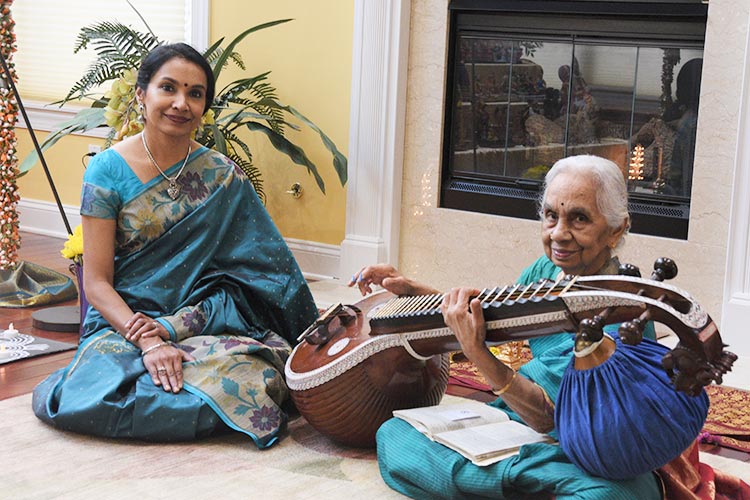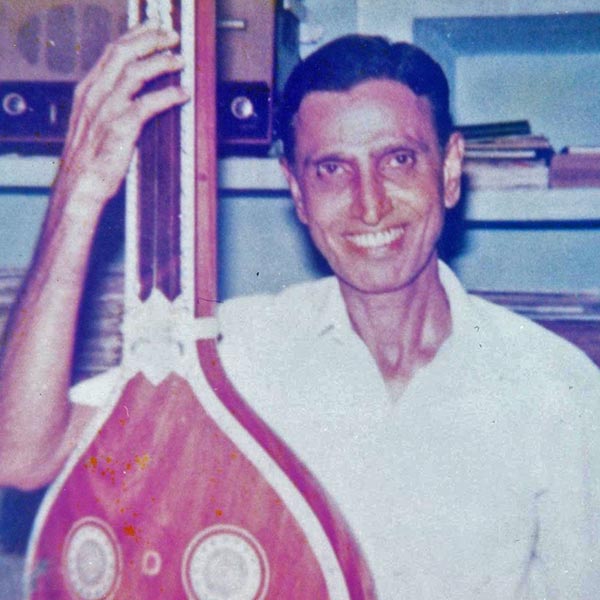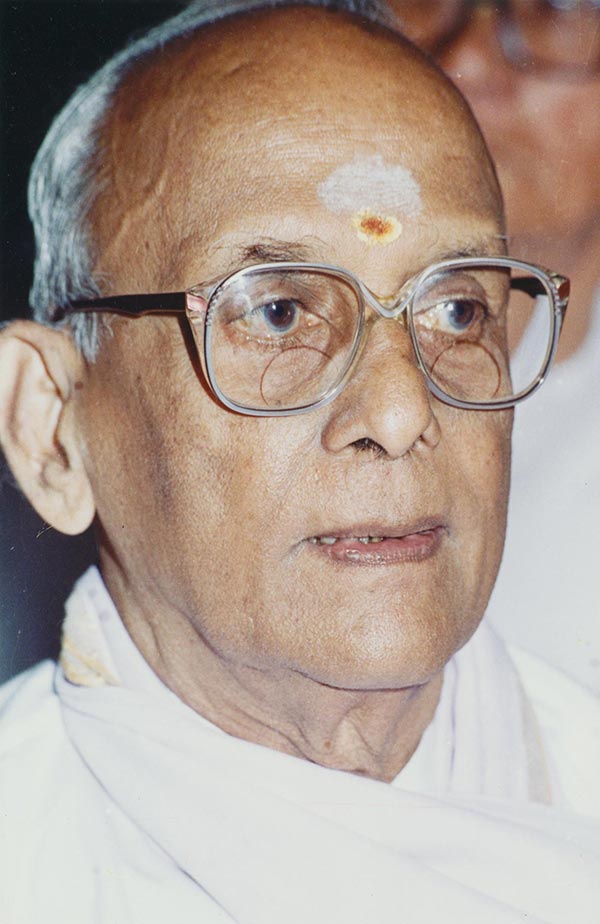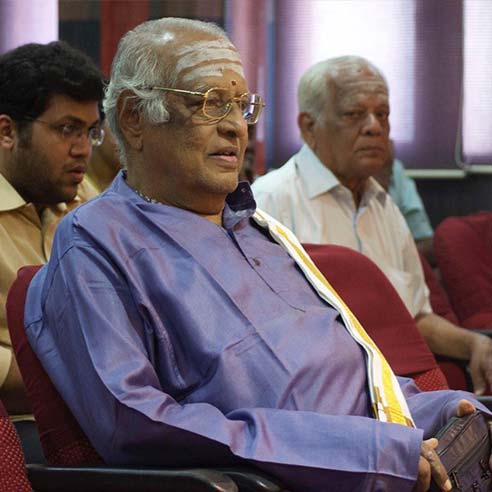Vijayam Ranganathan (mother)
Though I never learned formally from my mother, I consider her my first guru for a number of reasons. No matter how demanding the household matters were, no matter what else she had to take care of, my mother made sure that nothing stood in between me and my music lessons. Her veena practice was a constant backdrop of my childhood, during my study, play, or mealtimes. At other times, she turned the radio on for music she insisted I must listen to, initiating me to the music of great artists. She taught me the basic exercises and took me to concerts happening in town. She accompanied me to every single paattu class (lesson), as she would also have a separate veena lesson with the same guru after my lesson time. The scorching heat of Palakkad summers, or the lack of transportation facilities did not deter her. During my daily practices, she would play the tambura and sit with me, making sure I prepare well for my next lesson. She accompanied me to every single competition in and out of town, supporting me emotionally, physically, and musically. To this day, her high expectations for musical standards continue to push me, even if she may not be verbalizing it. An octogenarian, she still practices her veena a few times a week.

M.A. Venugopal (1925 – 1996) & Janaki Venugopal (1934 – 2018)

Sri. Venugopal belonged to a rich musical lineage. His brother M.A. Kalyanakrishna Bhagavatar was one of the foremost exponents of the veena, who taught at the Swati Tirunal College of Music in Tiruvanantapuram, and later at Wesleyan University for a brief period. His sister Parvathy Ammal was a talented vocalist and teacher. Sri Venugopal studied with his brother Kalyanakrishna Bhagavatar, Sri. Semmangudi Srinivasa Iyer, among other gurus at the music college in Tiruvanantapuram. During his time as a professor at the Chembai Music College at Palakkad in the 1970s, Sri Venugopal taught a number of other students at his home, along with his wife Smt. Janaki Venugopal. I was one of these fortunate students.
Sri Venugopal’s trademark style was to teach the purest of patanthara (traditional pedagogy) with utmost clarity. He had the ability to guide me towards singing a phrase perfectly right, in the gentlest of ways.
I am yet to meet a guru to this day of his caliber, who is as selfless, generous, and compassionate. I was not even ten years old, and he knew exactly when to give me a break as he would let me pet his cat in the middle of a lesson. Whenever my mother found it difficult to travel and take me to lessons, Venu Mama (as we affectionately called him) would ride his bicycle and come home to teach. The strong foundational musical values that he imparted continue to be my guiding light. At this time, I also learned several kritis from Janaki Venugopal, who also taught with utmost sincerity and affection.
When Sri Venugopal relocated to Chennai, he was generous enough to entrust my education with none other than one of his own gurus, Sri C.S. Krishna Iyer.
C.S. Krishna Iyer (1916 – 1998)

When I commenced learning with Sri C.S. Krishna Iyer at age 11, I was his youngest student. I was not cognizant of the stature and seniority of this erudite musician and scholar then. I now recall those days of intense learning with gratitude and nostalgia. Sri Krishna Iyer’s gurus were among the luminaries of Carnatic music, Ponniah Pillai, T.S. Sabhesa Iyer, and Tiger Varadachariar. He had imbibed the very best in the Carnatic tradition from gurus whose lineage can be traced back to the great composers Tyagaraja and Muttuswami Dikshitar. At the Swati Tirunal Academy of Music in Tiruvanantapuram, Sri Krishna Iyer worked alongside Muthiah Bhagavatar and Semmangudi Srinivasa Iyer on setting a number of Swati Tirunal’s lyrics to music. CSK Mama. Sri. Krishna Iyer has also composed several kritis in Malayalam, of which just a few are in circulation now. The renowned vocalist K.V. Narayanaswamy was Sri Krishna Iyer’s student for a brief time.
My time with CSK Mama (as I affectionately refer to him) was a time of building a solid repertoire. In my teens, I learned numerous Tyagaraja, Shyama Sastri and Dikshitar kritis from him. He had a preference for teaching Tyagaraja kritis, and he taught me a variety of those, small and large. Mama always lost track of time while teaching and the lessons would extend way beyond planned times. Often, I would have to hesitantly tell him that I needed to go do my homework! One of my fond memories is when I used to park my bicycle at his house and take a bus to college, and upon my return in the afternoon, his wife Easwari Mami would insist I that have some of her delicious adai or dosai.
CSK Mama offered wholesome music, with sincerity, not particularly caring about his students chasing competition prizes or concert opportunities. If I had to make a decision about an opportunity, I was afraid to bring such a plebeian interest to someone who was concerned with imparting lofty musical values. Nevertheless, he was always supportive. CSK Mama believed in freedom of expression, and always encouraged me to slightly modify or embellish the sangatis he taught and improvise freely.
Some of the best times I had are when he shared his personal insights on various aspects of music, or his own experiences interacting with other great musicians. I recall Sri S. Ramanathan and Sri K.V. Narayanaswamy and Sri Semmangudi Srinivasa Iyer visiting him at his house. Unfortunately, as a young student, I did not get to stick around when the senior musicians had their discussions.
Interacting with CSK Mama taught me to think, be original, and inquire deeper. He guided me through the journey of manodharma, not by structured preparation, but organically, gently pushing me to explore a little further each time. The fifteen years of discipleship with CSK Mama are central to my musical life.
P.S. Narayanaswamy (1934 – 2020)

Photo Courtesy: Akshay Padmanabhan
A chance introduction in London in 2003 brought me in touch with Sri P.S. Narayanaswamy, known as one of the foremost gurus in the modern history of Carnatic music. He had come to London on a brief assignment to teach at the Bharatiya Vidya Bhavan the same summer I had moved there. As Sri P.S.Narayanaswamy and Sri M.A. Venugopal (my first guru), were close friends as students of Semmangudi Srinivasa Iyer, (“namma school”, as he remarked), he was particularly happy to take me under his wings.
Sri PSN (PSN Mama or Pichai Mama as students affectionately call him) filled the vacuum I had been experiencing after the passing of my first two gurus. I continued learning with PSN Mama whenever I visited India, and over the phone, until 2016. I had the privilege of learning some of the most wonderful compositions in his repertory. PSN Mama’s teaching style and expectations were in perfect alignment with what my prior gurus had instilled in me, and I relished every single minute of my time with him. A perfectionist, he always expected a nuanced rendition of the sangatis he taught, with the tiniest of detail intact. It meant a great deal to get a ‘besh’, or a nod of approval from him. I am fortunate to have had Sri PSN Mama’s guidance for thirteen years.
